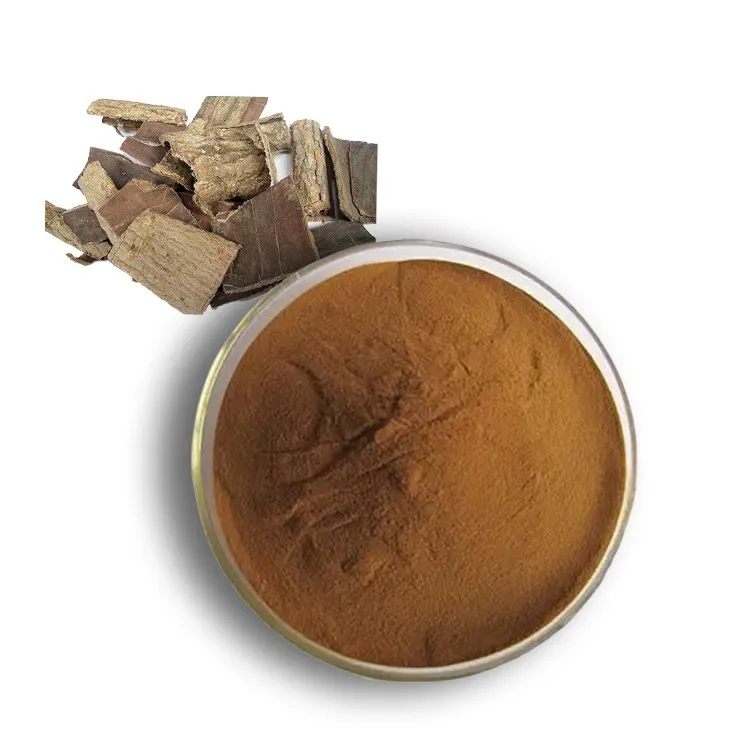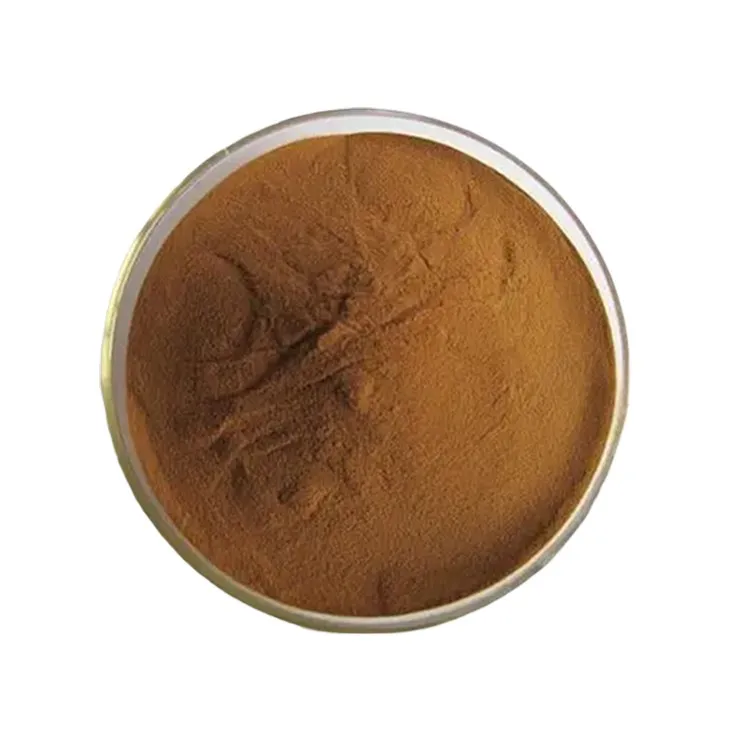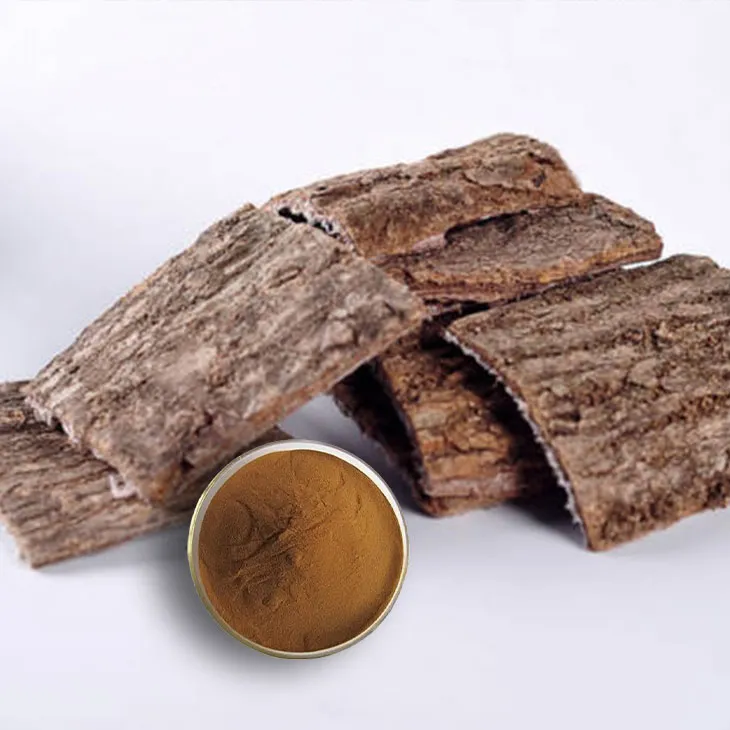- 0086-571-85302990
- sales@greenskybio.com
Clinical Insights: Recent Research on Eucommia Ulmoides Extract's Health Impact
2024-07-04

Introduction
Eucommia ulmoides, a traditional Chinese medicinal plant, has been used for centuries in Chinese medicine. In recent years, scientific research has focused on the extract of Eucommia ulmoides to explore its potential health benefits. This extract is rich in various bioactive compounds, which may play important roles in maintaining human health. The following will discuss the recent research findings on the health impact of Eucommia Ulmoides Extract from different aspects.

Metabolic Health
1. Glucose Metabolism
Recent studies have suggested that Eucommia Ulmoides Extract may have a positive influence on glucose metabolism. It is hypothesized that certain components in the extract may interact with the body's mechanisms related to insulin sensitivity. Insulin is a key hormone in regulating blood glucose levels. By enhancing insulin sensitivity, the body can more effectively utilize glucose, thereby helping to maintain normal blood glucose levels. For example, in some in - vitro and in - vivo experiments, the extract has been shown to stimulate glucose uptake in cells, similar to the action of some anti - diabetic drugs. However, more research is needed to fully understand the exact mechanisms and potential applications in the treatment of diabetes.
2. Lipid Metabolism
Regarding lipid metabolism, Eucommia Ulmoides Extract has also shown promising results. It may help in regulating lipid levels in the body. The extract could potentially affect the synthesis, transport, and breakdown of lipids. Some studies have indicated that it may reduce the levels of triglycerides and low - density lipoprotein cholesterol (LDL - C), which are often associated with an increased risk of cardiovascular diseases. At the same time, it may increase the levels of high - density lipoprotein cholesterol (HDL - C), which is considered "good cholesterol" as it helps in removing cholesterol from the arteries. These effects on lipid metabolism suggest that the extract may have a role in preventing and managing cardiovascular diseases.

Immune System
The impact of Eucommia ulmoides extract on the immune system is another area of great interest. 1. Immune - enhancing Properties
Research has shown that the extract may enhance immune function. It contains components that can stimulate the activity of immune cells, such as macrophages and lymphocytes. Macrophages are important for engulfing and destroying foreign pathogens, while lymphocytes play a crucial role in the body's specific immune responses. By activating these immune cells, the extract may help the body to better defend against infections. In addition, it may also modulate the production of cytokines, which are signaling molecules in the immune system that regulate immune responses. This modulation can help to maintain a balanced immune response, preventing excessive inflammation or immune suppression.
2. Anti - inflammatory Effects
Moreover, Eucommia ulmoides extract may possess anti - inflammatory properties. Inflammation is a natural response of the body to injury or infection, but chronic inflammation can lead to various diseases. The extract may act on the inflammatory pathways in the body, reducing the production of inflammatory mediators. For example, it may inhibit the expression of certain pro - inflammatory cytokines. This anti - inflammatory effect not only helps in the treatment of inflammatory diseases but also may contribute to overall health by reducing the long - term damage caused by chronic inflammation.

Nervous System
1. Stress Reduction
There is evidence to suggest that Eucommia ulmoides extract may play a role in reducing stress. Stress is a common factor in modern life and can have a negative impact on both physical and mental health. The extract may act on the body's stress - response system, which involves the hypothalamic - pituitary - adrenal (HPA) axis. By modulating the HPA axis, it may help to reduce the release of stress hormones such as cortisol. This can lead to a reduction in stress - related symptoms, such as anxiety and fatigue. In some animal studies, animals treated with the extract showed less stress - related behavior compared to the control group.
2. Cognitive Function Improvement
In addition to stress reduction, the extract may also have an impact on cognitive function. Cognitive function includes aspects such as memory, attention, and learning ability. Some components in the extract may have neuroprotective effects, protecting neurons from damage. It may also enhance the communication between neurons, which is essential for proper cognitive function. For example, in some preliminary studies on aged animals, the administration of Eucommia ulmoides extract has been associated with an improvement in memory performance. However, further research is required to confirm these effects in humans and to understand the underlying mechanisms.

Safety and Future Research
1. Safety Profile
So far, the available research on Eucommia ulmoides extract suggests that it has a relatively good safety profile. In general, when used at appropriate doses, no significant adverse effects have been reported. However, as with any natural product, individual sensitivities may exist. For example, some people may experience mild gastrointestinal discomfort. More comprehensive safety studies, especially long - term studies, are still needed to fully evaluate the safety of the extract, especially when considering its potential use in different populations such as the elderly, children, and pregnant women.
2. Future Research Directions
Despite the promising findings so far, there are still many areas that require further research. In terms of metabolic health, more in - depth studies are needed to elucidate the exact molecular mechanisms by which the extract regulates glucose and lipid metabolism. For the immune system, further research could focus on exploring the specific components in the extract that are responsible for its immune - enhancing and anti - inflammatory effects and how they interact with the immune system at the molecular level. Regarding the nervous system, larger - scale human trials are necessary to confirm the effects on stress reduction and cognitive function improvement. Additionally, research on the potential synergistic effects of Eucommia ulmoides extract with other drugs or natural products could also be an interesting area of exploration.
Conclusion
In conclusion, recent research on Eucommia ulmoides extract has revealed its potential health benefits in areas such as metabolic health, immune function, and nervous system regulation. While the current findings are promising, more research is needed to fully understand its mechanisms of action, safety, and potential applications in human health. As the interest in natural products with health - promoting properties continues to grow, Eucommia ulmoides extract may become an important candidate for further study and development in the field of medicine and health.
FAQ:
1. What is Eucommia ulmoides extract?
Eucommia ulmoides extract is a substance obtained from Eucommia ulmoides, a plant known in traditional medicine. It contains various bioactive compounds that are being studied for their potential health - enhancing properties.
2. How does Eucommia ulmoides extract assist in glucose metabolism?
Research suggests that certain components in the Eucommia ulmoides extract may interact with enzymes or receptors involved in glucose metabolism. It might enhance insulin sensitivity or influence the way cells take up and utilize glucose, although the exact mechanisms are still under investigation.
3. Can Eucommia ulmoides extract really enhance immune function?
There is evidence indicating that the extract may have a positive impact on the immune system. It could potentially stimulate immune cells or modulate immune - related signaling pathways. However, more research is needed to fully understand the extent and nature of this enhancement.
4. What is the possible mechanism of Eucommia ulmoides extract in reducing stress?
It may interact with the nervous system, perhaps by influencing neurotransmitter levels or the body's stress - response mechanisms. For example, it could affect the release or reuptake of hormones like cortisol, which are involved in the stress response, but the specific details are yet to be determined.
5. How does Eucommia ulmoides extract improve cognitive function?
Some studies suggest that it might have an impact on the nervous system in a way that benefits cognitive function. This could involve promoting neuronal growth, enhancing synaptic plasticity, or reducing oxidative stress in the brain. However, the exact ways it achieves this are still being explored.
Related literature
- Recent Advances in the Pharmacological Research of Eucommia ulmoides"
- "The Bioactive Components of Eucommia ulmoides Extract and Their Health - related Effects"
- "Eucommia ulmoides Extract: A Potential Natural Agent for Metabolic and Immune Regulation"
- ▶ Hesperidin
- ▶ Citrus Bioflavonoids
- ▶ Plant Extract
- ▶ lycopene
- ▶ Diosmin
- ▶ Grape seed extract
- ▶ Sea buckthorn Juice Powder
- ▶ Fruit Juice Powder
- ▶ Hops Extract
- ▶ Artichoke Extract
- ▶ Mushroom extract
- ▶ Astaxanthin
- ▶ Green Tea Extract
- ▶ Curcumin
- ▶ Horse Chestnut Extract
- ▶ Other Product
- ▶ Boswellia Serrata Extract
- ▶ Resveratrol
- ▶ Marigold Extract
- ▶ Grape Leaf Extract
- ▶ New Product
- ▶ Aminolevulinic acid
- ▶ Cranberry Extract
- ▶ Red Yeast Rice
- ▶ Red Wine Extract
-
Acerola Extract
2024-07-04
-
Coconut Water Powder
2024-07-04
-
Natural grape seed extract
2024-07-04
-
Andrographis Paniculata Extract Powder
2024-07-04
-
Licorice Root Extract Powder
2024-07-04
-
Eyebright Extract
2024-07-04
-
Saw Palmetto Extract
2024-07-04
-
Acai Berry Extract
2024-07-04
-
Marigold Extract
2024-07-04
-
Pine bark Extract Powder
2024-07-04





















